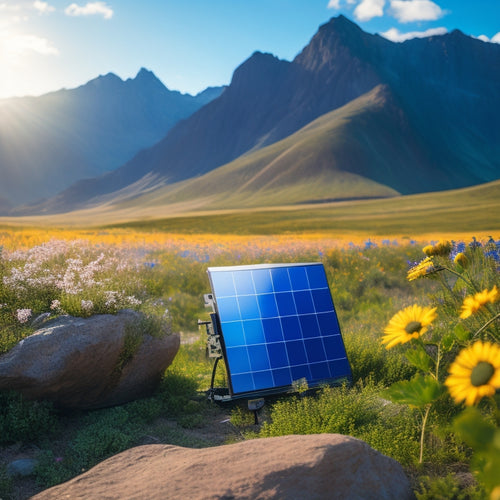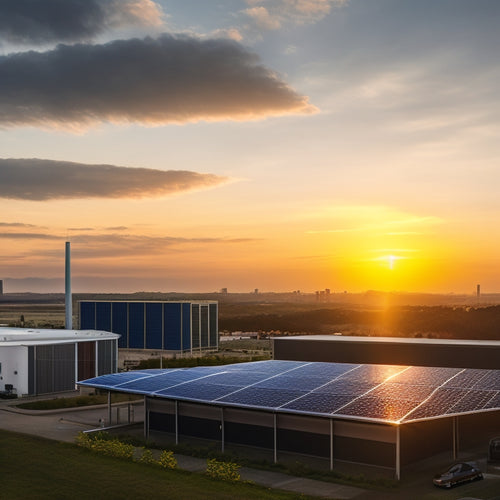
Environmental Impacts of Solar Cooking Stoves
Share
Solar cooking stoves considerably reduce environmental impacts by lowering carbon emissions, cutting up to 1.5 tons annually per household. They employ renewable solar energy, lessening reliance on fossil fuels and improving air quality. By avoiding traditional fuels like wood and charcoal, they diminish indoor air pollution and enhance safety in cooking. The efficiency of modern designs promotes sustainable practices, while their portability encourages community engagement. This shift not only contributes to healthier lifestyles but also aligns with broader climate goals. Exploring further will reveal additional perspectives into the benefits and practicality of solar cooking stoves.
At a Glance
- Solar cooking stoves significantly reduce carbon emissions, cutting up to 1.5 tons per household annually by replacing traditional cooking fuels.
- Utilizing solar energy decreases reliance on fossil fuels, contributing to a lower overall carbon footprint and promoting sustainability.
- The use of solar cooking stoves improves air quality by eliminating indoor air pollution associated with burning biomass fuels.
- Solar stoves enhance energy efficiency in cooking, leading to further reductions in greenhouse gas emissions and fostering environmentally conscious practices.
- Community engagement and education around solar cooking promote awareness and adoption of renewable energy solutions, amplifying environmental benefits.
Sustainable Energy Source Option
Solar cooking stoves represent a viable renewable energy option that utilizes sunlight, reducing reliance on fossil fuels.
By using these stoves, you can considerably lower your carbon footprint, contributing to a more sustainable environment.
Solar cookers provide sustainable cooking options that not only benefit individual users but also support broader efforts to mitigate climate change.
This shift not only benefits individual users but also supports broader efforts to mitigate climate change.
Renewable Energy Advantage
While many energy sources contribute to environmental degradation, solar cooking stoves offer an enticing renewable energy advantage by utilizing the sun's power in a sustainable manner. By utilizing solar energy, these stoves improve cooking efficiency while reducing reliance on fossil fuels. This shift encourages greater environmental awareness, as users often become more conscious of their energy consumption and its impacts.
The community benefits are significant; solar cooking stoves promote cost savings by lowering fuel expenses and enabling access to local resources. Additionally, technology integration can facilitate various designs suited to different cultural settings, enhancing cultural acceptance.
As these stoves become more prevalent, they can support educational outreach programs that teach individuals about renewable energy and sustainable practices. Furthermore, solar cooking stoves encourage food diversity by allowing the preparation of various cuisines without the limitations of traditional cooking methods.
They also create opportunities for outdoor activities, as families gather to cook and share meals under the sun. Essentially, solar cooking stoves not only provide a sustainable energy source but also enhance communities, promote educational initiatives, and promote a healthier lifestyle.
Reduced Carbon Footprint
The adoption of solar cooking stoves considerably reduces carbon footprints, making them an intriguing sustainable energy source. By utilizing solar energy, these stoves eliminate the need for fossil fuels, which are significant contributors to greenhouse gas emissions. When you switch to solar cooking, you're not just saving money on fuel; you're also playing an essential role in mitigating climate change.
Research indicates that using solar cookers can cut carbon emissions by up to 1.5 tons per household annually. This reduction stems from decreased reliance on wood, charcoal, or gas—traditional cooking fuels associated with deforestation and air pollution.
The environmental benefits extend beyond carbon footprint reduction; solar cooking stoves also contribute to improved air quality, both indoors and outdoors.
Moreover, as solar cooking technology evolves, it continues to become more efficient, appealing to those who prioritize sustainability. By opting for solar cooking, you're embracing a cleaner, healthier lifestyle while actively participating in the global effort to reduce carbon emissions.
In this way, solar cooking stoves offer not just an alternative method of preparing food but also a meaningful path toward a more sustainable future.
Healthier Cooking Environment
Using solar cooking stoves greatly reduces indoor air pollution, as they eliminate the need for burning traditional fuels that release harmful emissions.
This sustainable cooking method not only decreases reliance on fossil fuels but also enhances the overall energy efficiency of meal preparation, as seen in compact solar cooking appliances.
This shift not only improves air quality but also encourages safer cooking practices by reducing the risk of fire hazards associated with open flames.
Reduced Indoor Air Pollution
How can adopting solar cooking stoves greatly improve indoor air quality? By shifting from traditional cooking methods, you can considerably reduce smoke inhalation, a leading cause of respiratory issues and other health risks.
In many rural communities, particularly those facing energy poverty, reliance on biomass fuels for cooking exacerbates indoor air pollution, impacting the health of women and children who often spend more time near the stove.
Solar cooking stoves enhance cooking efficiency without the harmful emissions associated with conventional methods. This shift not only mitigates health risks but also aligns with cultural practices that prioritize family well-being and food security.
As you accept solar cooking, you challenge established gender roles, enabling women to cook in safer environments while promoting sustainable practices.
Moreover, the economic impacts of adopting solar stoves are significant. Reduced medical expenses linked to smoke-related illnesses can free up resources that families can allocate towards education or other essential needs.
Safer Cooking Practices
Adopting solar cooking stoves alters cooking into a safer practice, considerably reducing the risks associated with traditional methods. Traditional cooking methods often rely on open flames or solid fuels, which can lead to hazardous indoor air quality and increased risk of burns or fires. By using solar energy, you enhance cooking safety, creating a healthier environment for you and your family.
Solar stoves operate without emissions, eliminating the harmful pollutants linked to conventional cooking practices. This shift not only protects respiratory health but also diminishes the likelihood of fire-related accidents.
Furthermore, solar cooking promotes food preservation. When cooked at lower temperatures, food retains more nutrients and flavor, which is essential for maintaining a balanced diet.
Additionally, the stability of solar stoves allows you to cook unattended, freeing you from constant supervision and reducing the potential for accidents. This convenience contributes to a less stressful cooking experience, further enhancing safety.
As you consider solar cooking options, it's clear that these stoves offer practical benefits, setting the stage for a future where cooking isn't only efficient but also safer and healthier for everyone involved.
Unique Design Elements
When you consider solar cooking stoves, the unique design elements play an essential role in their effectiveness and usability.
The utilization of reflective materials maximizes sunlight absorption, enhancing cooking efficiency, and promotes a diverse energy strategy that supports renewable energy practices.
A compact and portable design makes these stoves accessible for various settings.
Understanding these features can help you appreciate how they contribute to both environmental sustainability and user convenience.
Reflective Materials Utilization
Reflective materials play an essential role in the design and efficiency of solar cooking stoves, enhancing their ability to concentrate sunlight for cooking purposes. The effectiveness of a solar stove largely depends on the quality of its reflective surface. Materials like aluminum foil, polished stainless steel, or specialized reflective films are common choices due to their high reflectivity, guaranteeing ideal sunlight capture.
You should consider the balance between reflectivity and material durability when selecting reflective materials. While some highly reflective surfaces may offer superior performance, they mightn't withstand the elements or frequent usage. For example, while aluminum foil is inexpensive and easy to manipulate, it can tear or degrade quickly under harsh conditions.
On the other hand, polished stainless steel provides a more durable option, maintaining its reflective properties over time.
Ultimately, the choice of reflective materials impacts not only the efficiency of the solar stove but also its longevity and sustainability. By prioritizing both reflectivity and durability, you can guarantee that your solar cooking stove remains effective in utilizing solar energy, enabling you to cook sustainably and efficiently.
Compact and Portable Design
The efficiency of solar cooking stoves is greatly enhanced by a compact and portable design, allowing users to take advantage of sunlight in various environments. This design typically incorporates lightweight materials, making it easy for you to transport and set up the stove anywhere, whether you're at a campsite or in your backyard.
The use of these materials not only reduces the overall weight but also minimizes the energy footprint associated with manufacturing.
User-friendly features are integral to the appeal of solar cooking stoves. Many models include adjustable reflectors and simple folding mechanisms, facilitating quick assembly and disassembly.
This ease of use enables you to utilize solar energy without requiring extensive knowledge or technical skills. Additionally, the portability of these stoves encourages a lifestyle that welcomes outdoor cooking, reducing reliance on traditional fuels, which can have detrimental environmental impacts.
Selecting Based on Cooking Style
When selecting a solar cooking stove, consider your preferred cooking methods, as different designs cater to various techniques.
Efficiency and heat retention are essential factors that can impact your cooking experience and energy use.
Cooking Methods Consideration
Considering your cooking style is essential when selecting a solar cooking stove, as different methods demand varying levels of heat and cooking times.
If you prefer slow-cooking techniques like stewing or braising, a solar cooker with good heat retention and efficient heat distribution will work best. These methods require consistent low temperatures over extended periods, making it necessary to choose a model designed for such applications.
On the other hand, if you lean towards quick cooking techniques such as frying or sautéing, you'll need a stove that can reach and maintain higher temperatures. Some solar cookers are better suited for these tasks, capable of reflecting sunlight effectively to achieve the desired heat levels.
You should also consider the size and shape of your cookware, as these factors influence how well the stove accommodates your cooking techniques. For instance, wider pots may distribute heat more evenly, while smaller ones might focus the heat more effectively, depending on your style.
Ultimately, understanding your specific cooking preferences will guide you in selecting the most appropriate solar stove, ensuring you maximize both efficiency and enjoyment in your culinary pursuits.
Efficiency and Heat Retention
Efficiency and heat retention are vital factors in selecting a solar cooking stove that aligns with your cooking style. When you evaluate a solar stove, consider how well it distributes heat.
Efficient heat distribution guarantees that your food cooks evenly, preventing hot spots that can lead to uneven cooking or burning. Look for models that maintain consistent temperature levels to enhance cooking efficiency, especially for dishes requiring longer cooking times.
If you're a fan of slow-cooked meals, a solar cooker with excellent heat retention is important. These stoves trap heat effectively, allowing you to cook without constant sunlight, which is significant for flexibility in your cooking schedule.
On the other hand, if you prefer quick meals, you might prioritize a model that heats up rapidly and can reach higher temperatures quickly.
Understanding your cooking habits will guide you in making informed choices. By evaluating the heat distribution and overall cooking efficiency of various solar stoves, you'll be better equipped to select one that suits your culinary preferences and lifestyle, ultimately enhancing your cooking freedom while minimizing environmental impact.
Lower Carbon Footprint
Using solar cooking stoves considerably reduces your dependence on fossil fuels, which contributes to a lower carbon footprint.
By utilizing the sun's energy, you can cook without emitting greenhouse gases associated with traditional cooking methods.
This shift not only benefits the environment but also promotes sustainability in your cooking practices.
Reduced Fossil Fuel Dependence
Switching to solar cooking stoves considerably cuts down on fossil fuel dependence, leading to a lower carbon footprint for households and communities. By utilizing solar energy, you're using a renewable resource that diminishes reliance on traditional cooking fuels, such as wood, coal, or gas. This change not only promotes energy independence but also enhances environmental benefits by reducing greenhouse gas emissions.
The integration of solar cooking technology can also yield significant cost savings. Without the need for purchasing fuel, families often find that their monthly expenses decrease, allowing for better allocation of resources.
Additionally, solar stoves align with various cultural practices, enabling communities to maintain traditional cooking methods while adopting modern, sustainable solutions.
Community engagement is crucial in this change, as sharing knowledge about solar cooking can encourage collaboration and innovation. As you adopt this cooking method, you also contribute to food preservation, as solar cooking techniques often retain more nutrients compared to conventional methods.
Frequently Asked Questions
How Do Solar Cooking Stoves Affect Local Wildlife Habitats?
You'll find that solar cooking stoves can positively influence wildlife conservation and habitat preservation. By reducing deforestation for fuel, they help maintain ecosystems, allowing local wildlife habitats to thrive while promoting sustainable living practices in communities.
What Materials Are Used in Solar Stove Construction?
When you investigate solar stove construction, you'll find sustainable materials like aluminum and glass enhance heat retention. These choices not only maximize efficiency but also align with eco-friendly practices, promoting a greener lifestyle without sacrificing functionality.
Can Solar Cooking Stoves Be Recycled at the End of Their Lifespan?
You might wonder if solar cooking stoves can be recycled. Yes, they can! Recycling processes often reclaim materials, promoting sustainability practices that reduce waste and support a circular economy, ensuring a greener future for everyone.
How Do Solar Stoves Perform in Different Climatic Conditions?
Solar stoves' performance varies with climatic conditions, influencing solar efficiency and climatic adaptability. In sunny areas, they excel, while cloudy or colder regions may reduce effectiveness. Understanding these factors helps you optimize cooking methods.
Are There Any Negative Environmental Impacts From Manufacturing Solar Stoves?
When you consider the manufacturing of solar stoves, you'll notice potential negative impacts. Manufacturing emissions and resource extraction can contribute to environmental degradation, despite the stoves' benefits, requiring careful evaluation of their overall ecological footprint.
Explore More
In considering solar cooking stoves, you're not just choosing a sustainable energy source; you're also embracing a healthier cooking environment. The unique design elements cater to various cooking styles, allowing for flexibility in meal preparation. By selecting solar stoves, you contribute to a lower carbon footprint, making a positive impact on the planet. Coincidentally, as you capture the sun's power for your meals, you're also nurturing a brighter future for generations to come.
Related Posts
-

Key Components of a Reliable Emergency Power Supply System
A reliable emergency power supply system requires several key components. You need proven performance metrics to guar...
-

High-Efficiency Solar Battery Chargers for Remote Areas
High-efficiency solar battery chargers are essential for your off-grid energy needs in remote areas. They maximize en...
-

Advantages of Commercial Solar Battery On-Site Storage
By investing in a commercial solar battery on-site storage system, you can greatly reduce your energy grid dependence...


